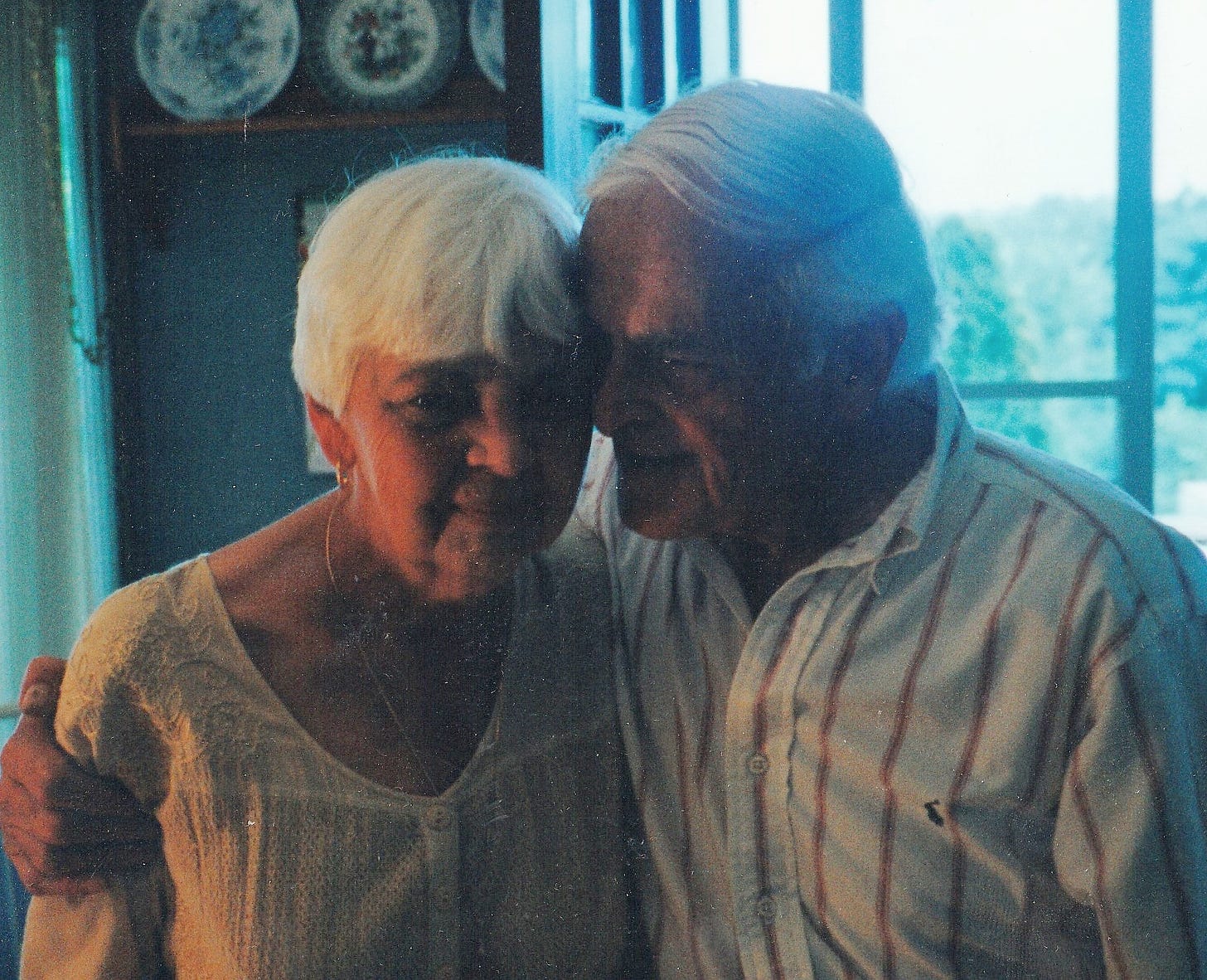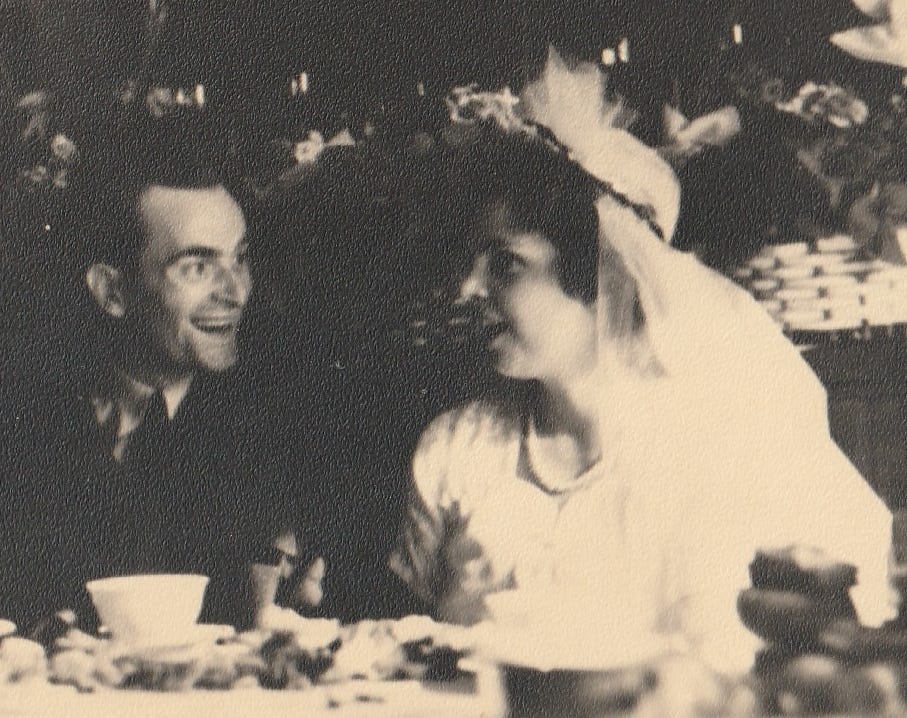A marriage of true minds as well as broken hearts and dreams.
Both are long dead, but today is my parent's 75th wedding anniversary. During their lives, my parents were able to celebrate together fifty-one wedding anniversaries before my mum died at the age of seventy-one from cancer, in 1999. Mum concluded her life as she had begun her marriage with a kiss, except this one was farewell to her husband.
That last kiss was to reassure my father that her love would endure, for him, even after she stepped over the border into nonexistence. My dad would not have made it through the night of her death without that kiss. Mum was the only one in our family who understood how emotionally fragile dad was, even at seventy-five. His grown-up boys did not get it because, for us, dad was a rock; we clung to him in both storm and sunny weather. My mother knew better, and a few days before dying, she tried to cryptically warn me that my dad would need help after she was gone.
I didn't understand at first. I had come to visit her, not knowing she'd soon be dead. It was thought she was just ill as she had been for years with rheumatoid arthritis, heart disease, and the stress of being a caregiver for my brother Peter who suffered from schizophrenia.
It was mid-morning; outside, birds sang in the trees while a June sun stretched through the window like a cat after waking from a nap. She was lying down on her bed, a paperback of Virginia Woolf's The Waves folded against her chest. “I am just a bit tired and need to rest.”
And me where was I? I was standing near her, but, in my thoughts, I was miles away. I was wondering if I was going to be late for a meeting at work and lamenting that my girlfriend had dumped me a month earlier. I was about to leave with a “See you later,” when my mother declared to me or perhaps herself, “I am glad I could give your father the love he needed to survive.” At the time, I did not realise then it was a clue to the intricacies of my parent's marriage, their relationship with each other, and in many ways, the debt that my father and her children owed her for a sacrifice made long ago.
When my parents married in Hamburg on August 16th, 1947, Europe was in a heatwave. The greatest war fought by the greatest generation was only two years done, and the world was still licking its wounds from that brutal conflict between good and evil. My mum was an 18-year-old German woman, and my dad was a 23-year-old lad from Yorkshire stationed in the city as part of Britain’s occupation force following the war. They both suffered from traumas caused by the war but also what they had experienced growing up as children.
My parents, like most young people, stumbled into their love affair by chance. My dad noticed my mother bartering away prized family possessions at a black market. He thought she was the most beautiful woman he had ever seen, and he lusted after her. So, he pursued her and eventually, they became lovers. My mum did not have as strong a feeling for my dad as he had for her when they were first lovers. Life was short, and she was young and wanted to taste as many pleasures as possible because she had seen so much death and come close to it herself. Over time, because of his devotion to her, and his endless ability to help her, and her family, in an unforgiving post-war world, the love my mother had for my father became strong enough to agree to his marriage proposal.
Marriage to a German wasn't an easy thing to arrange after the second world war. If you wanted it, you had to fight for it, and fight my dad did. He fought against the laws preventing marriage between British servicemen and German women. He fought against the prejudice of friends and family. He took ex-communication from the Roman Catholic Church on the chin after he told the bishop of Hamburg to fuck off after he called my mother a prostitute, for wanting to marry an Englishman. He travelled to Brussels to find silk for my mother's wedding dress. My dad did every backroom deal possible with black marketeers to ensure their wedding would be well stocked with beer, food, and taxis home for the German guests.
It was a good wedding in harsh times. People got drunk, people danced to phonograph records and people felt happy an emotion that was still on rations after the war. It was an occasion that allowed everyone at the wedding to feel hopeful for their futures and Europe’s.
But that moment of optimism did not last. It was gone by the time my parents left Hamburg and returned to Halifax. There my dad’s mother and his siblings resided on a grim side of town where one up one downs dotted the landscape as if they were broken blood vessels on the nose of an alcoholic.
It was a hard transition for my mum to leave Germany, her family, her friends, and her language for one man and come to Halifax. She was only nineteen and didn’t fit into life in a Yorkshire mill town. How could she? She was strikingly beautiful, as well as never shy about expressing an opinion and the town folk knew she was German.
It didn’t help that my dad, after living rough and ready during the Great Depression was not emotionally equipped to be in a marriage where both partners were psychologically damaged goods. Being in that relationship with my mum gave my dad an identity, a sense of self-worth that he never had before then because of the poverty he experienced as a boy. In the early days of their marriage, he hung on to my mother’s love like a shipwreck survivor hangs on to a piece of wreckage in a raging sea. Needing so much love from another to fill the vastness of not being loved as a child was a role my mother could not fulfil. She soon realised that her husband was a different man in Halifax than the man who took her on canoe rides on the Alster in Hamburg. In Halifax, he was a man haunted by his past.
Their marriage foundered. There were slammed doors in bed-sitting rooms and voices raised in both German and English. There were moments of silent, malignant, mutual resentment.
It became too much for my mum and, with great courage, she left him and returned to Germany.
After she upped sticks from my dad's heart, my father did not think he wanted to live. Old self-doubts and self-hatreds returned to nest in his reason and told him he was a loser. In Germany, my mother felt great regret and emotional upset at leaving my father. To try to forget her failed marriage, my mum travelled across Germany which was still ravaged by war. On these travels, she also hoped to find news about her father, who had disappeared in Berlin during the Soviet army's battle for that city in April 1945.
Over the months of their separation, my dad worked his job as a manual labourer at Macintosh’s, read books, listened to jazz, and understood that if he were to reignite his marriage that he must meet my mother halfway when it came to emotional needs and wants. They began corresponding with each other. Over time my dad convinced her to resume her relationship with him again. My mother agreed but with one non-negotiable condition, “We must emigrate away from England and Germany and start a new life in Canada.” It was not that she disliked Britain; it was that as a stranger, she understood better that the prejudices against the working class were never going to allow my dad a leg up in that society, even with a Labour government.
There was much love, respect, comradeship, and laughter between my parents in their marriage. There were also secrets in their marriage, along with lost hopes that could not be materialised within their marriage. My parents were wonderfully caring individuals who were also profoundly dysfunctional. But like an iceberg, their jagged brokenness was well hidden below the surface.
When my mother told me before her death, "I am glad I could give your father the love he needed to survive. I did not understand what it meant. Only after my brother, Peter died; ten years later, did I realise it was a clue to the inner workings of their marriage but also a request to ensure my dad was loved so that both he and his survivors could meet their true potential.
I do not think Harry's Last Stand would have been dared into existence or the four other books written had I not realised how much energy my mother used to keep my dad afloat through her life rather than expend it on herself to become the brilliant person she could have been.
Thank you for reading this. As Elon Musk is running Twitter- I have no idea how long the platform can survive. It is why I put together on substack the Tweets from the week my father lay dying in a hospital in November 2018. I want to preserve all those thousands of tweets made on the Harry’s Last Stand account because they speak of a time and a place when we could have stopped fascism. It is his history, my history and your history in many ways too. Your solidarity with me as a subscriber to my substack is so appreciated.
Take care, John.




